[Note: This interview originally appeared in Opera Scene Magazine in January, 1983.
It was slightly re-edited, and the links and photos were added for this website
presentation.]
A Conversation with Elena Mauti-Nunziata
By Bruce Duffie
Perhaps the biggest “hit” of the just completed Lyric Opera season was
the new and innovative production of Puccini’s Madama Butterfly directed by Harold Prince. There
were ten performances (plus two student matinees) and all were very well
received. In the title role was Elena Mauti-Nunziata, a fine soprano
from Naples who had sung once before at Lyric – in 1976 as Gilda in Rigoletto (with Norman Mittelmann
in the title role and Pavarotti as the Duke. Mittelmann, you will recall,
also returned this season as the four villains in the opening production
of Hoffmann.)
Elena Mauti-Nunziata studied in Naples and made her operatic debut in
Palermo in 1965 as Liù in Turandot.
Since that time, she has sung many performances as Mimì in La Bohème and Cio-Cio-San in Madama Butterfly, as well as the title
role in Turandot. She now
looks forward to singing Manon Lescaut and also Tosca (“in a few years.”)
Besides all this Puccini, she has also given fine performances as Violetta,
Marguerite, Leïla, and Nedda in many of the world’s leading opera houses
including La Scala, Covent Garden, The Met, Paris, and Hamburg. Her
American debut was in Dallas as Elvira in I Puritani.
During her stay in Chicago for Butterfly,
the soprano was most gracious to spend time one afternoon chatting with
Opera Scene. Her husband was
also there and made several interesting comments, and several times everyone
present – the singer, her husband, the interviewer
and the translator – were simply roaring with laughter.
My thanks to Marina Vecci of Lyric Opera for providing the translation.
Here is
some of what transpired on that delightful afternoon…….
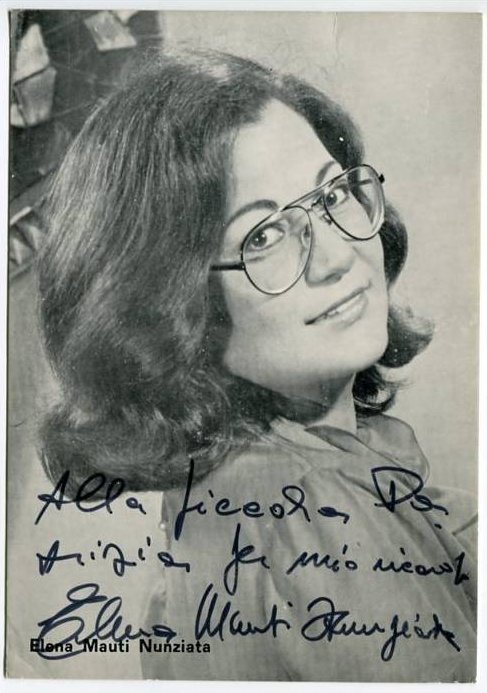
Bruce Duffie: Where
is opera going today?
Elena Mauti-Nunziata:
I hope that opera is going in the right direction. It is going toward
the younger generation, and therefore it will have a brilliant future in
the same way that is has a brilliant past.
BD: Is the future as bright
as the past?
EM-N: My answer
is somewhat egotistical because I hope that the future is much more brilliant!
Opera in the past was just for a few privileged people, but in the future
opera will be for everyone.
BD: Is opera not
for everyone today?
EM-N: Today opera
is going toward the larger audience.
BD: Does opera belong
on the television?
EM-N: Personally
I don’t like opera on TV, but the audience has a different taste.
BD: Have you appeared
on the tube?
EM-N: Yes, I’ve
done Traviata, Turandot, Pagliacci and a few concerts.
BD: When you’re
working in front of the camera, are you conscious of it or do you just play
to the audience?
EM-N: No, I don’t
take into consideration the cameras. I just sing to the audience.
BD: Does the size
of the house make a difference to your performance?
EM-N: I am worried
up until the time I sing my first few notes, and then I immediately realize
what type of house it is. The production of the voice does not depend
on the largeness or smallness of the house, but on the vibrations in the
voice itself.
BD: So it’s the
same for you in large houses and small ones?
EM-N: I sing the
same in the Arena in Verona, which is a tremendous open-air place, as in
the Salle Garnier, which is so small that you can hardly call it a theater.
BD: Tell me a bit
about your current role – Madama Butterfly – do you approve of Mr. Prince’s
ideas, and do you alter your conception of a role because of the production?
EM-N: I very much
approve of new concepts – for instance, this Hal Prince production of Butterfly which is sort of a cinematic
style where things keep moving. I also like the transformation of Butterfly
herself. The exterior change is the least important – the most important
change is what occurs inside as she becomes an Americanized woman.
This is very close to my own view of the role.
BD: Do you become
Butterfly, or are you still Elena Mauti-Nunziata playing Butterfly?
EM-N: When I step
onto the stage, I become the character – there is no more Elena while I
am singing. If you remember the Rigoletto
here a few seasons ago, or if you have seen me in other operas, you can
see that I change radically according to the character that I have to play.
For me, that is the only way to perform. Otherwise it would be very
hard to interpret it vocally.
BD: Are any of the
characters you play too emotionally draining for you?
EM-N: Butterfly
is one, and also Traviata. These are roles that drain me physically
and also spiritually as well.
BD: How long does
it take you to recover?
EM-N: Luckily I
am a very calm person, so I am regenerated quite easily even after a very
exhausting performance. This is why, though, I don’t go to parties
or social events after a performance – I simply don’t have the emotional
strength to give to it.
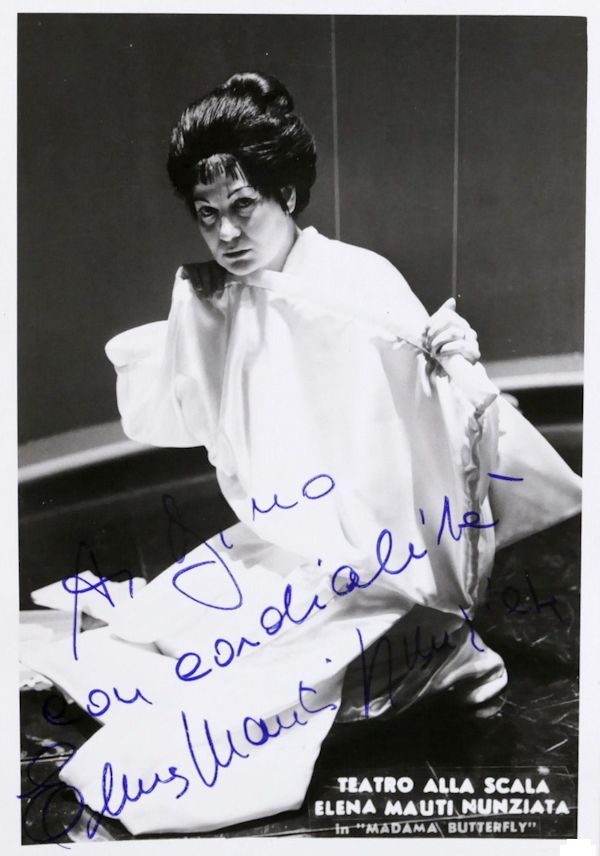 BD:
Does taking curtain calls after a performance break the spell for you?
BD:
Does taking curtain calls after a performance break the spell for you?
EM-N: I think the
curtain calls are a duty that the artist owes to the public. I do
object when a colleague bows in the midst of a performance – perhaps after
a big aria. That interrupts the continuity of the show.
BD: What about curtain
calls after individual acts?
EM-N: To be very
honest, I missed the first-act curtain call in this Butterfly production. I see the
curtain calls at the end of the acts as a meeting-point between the artists
and the public, where we all communicate what we thought of the preceding
performance.
BD: So it doesn’t
break the spell, then?
EM-N: There is already
a break because of the conclusion of the act so the curtain calls are a reasonable
ending. Then everyone gets re-charged again for the following act.
BD: How long does
it take for you to get into character?
EM-N: I am all for
concentration in a character, but I don’t think it’s necessary to spend
three or four hours getting prepared and thinking about a character before
a performance. I come to the theater very early, but not three hours
before. It only takes me a short time to concentrate and get into
the character before going on.
BD: Does that concentration
carry you through the intermissions?
EM-N: I simply use
the same technique a few minutes before returning to the stage to get back
into the character. Perhaps the word “technique” is not the right
one, but…
BD: Are there places
where the intermissions are too long?
EM-N: No, never.
BD: Are they too
short?
EM-N: Almost always!
In this production, the one break is a bit longer than usual, but that is
because there is only one rather than the usual two.
BD: Do you do Traviata
in three acts or four?
EM-N: It really
depends on the physical production and whether the producer can solve the
problems. In some places I’ve done it in three pieces, and in others
there have been four.
BD: Verdi wrote
it in three so when it’s done otherwise I often think, “Poor Verdi.”
EM-N: No, not “Poor
Verdi” because he was the one to be nasty to the singers.
BD: Did Verdi ask
things of the singers that are impossible???
EM-N: Well, if Verdi
wrote it that way, it must have been possible in those days to sing it that
way. So there is no reason why it shouldn’t be sung that way today,
except that it does require a little bit of an effort.
Husband: In those
days, the pitch of the orchestra was lower, and there were fewer dramatic
needs to be taken into account. Now the orchestra is higher in both
pitch and volume, and the public expects you to attend much more to the
dramatic aspects. So it is heavier to sing Traviata today.
BD: Are you happy
that opera is more theatrical today?
EM-N: Oh yes.
I am very happy about that because I love the character first and foremost
even before the singing part of it. The exploration of the character
is one way of approaching the public in a more direct way, making it more
understandable.
* *
* * *
BD: You’ve said
that you enjoy new concepts in staging. Are there some productions
that go too far?
EM-N: I’ve seen
examples of productions which went a long way beyond the tradition, including
a couple at La Scala. But what is important when doing things that
depart from the tradition is to do them with a great deal of intelligence,
in which case even though they are different they are very well accepted
and they work very well. A good example of that would be the Butterfly I did at La Scala which is very
different from the traditional style, but a very beautiful production.
BD: How is it different?
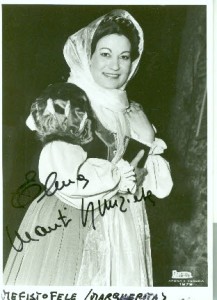 EM-N: There was no bridge and no flowers. It
was a lacquered platform with a tall cylinder that enclosed the platform
and nothing else but a sort of veil around the cylinder. All there was,
was Butterfly talking to some puppets. You might laugh at this description,
but the concept of the director was that no one in this day and age would
believe that a girl, however young, would believe the “line” from Pinkerton.
So the director was showing Butterfly living in a world of her own making,
and all the characters that enter into it are creatures of her imagination.
They’re not real – it’s all a fantasy. But this is enough about the
other Butterfly – there is so much of interest in this one here in Chicago.
It is very beautiful and it fits with my own concept. Mr. Prince and
I were able to work together very well without any disagreement – it was
a perfect communion of thought and of work.
EM-N: There was no bridge and no flowers. It
was a lacquered platform with a tall cylinder that enclosed the platform
and nothing else but a sort of veil around the cylinder. All there was,
was Butterfly talking to some puppets. You might laugh at this description,
but the concept of the director was that no one in this day and age would
believe that a girl, however young, would believe the “line” from Pinkerton.
So the director was showing Butterfly living in a world of her own making,
and all the characters that enter into it are creatures of her imagination.
They’re not real – it’s all a fantasy. But this is enough about the
other Butterfly – there is so much of interest in this one here in Chicago.
It is very beautiful and it fits with my own concept. Mr. Prince and
I were able to work together very well without any disagreement – it was
a perfect communion of thought and of work.
BD: Did you bring
any of the concepts from other productions with you to this one?
EM-N: Of course
I brought in things I’ve learned while doing the role so many times – not
so much in terms of entering from certain directions or the like, but rather
things having to do with attitude and gestures. Often, when seeing
what I was doing with certain lines, Mr. Prince would agree that it was the
right thing to do, so I would go ahead and continue doing it. As I
mentioned before, it was a communion between myself and Mr. Prince, for although
I brought in gestures and other details, he immediately recognized them as
being pertinent to the character. It’s also possible that I might have
been anticipating some of his ideas.
BD: Is this the
mark of a great director – the ability to take what the performer brings
and mold that rather than forcing a pre-conceived idea on you?
EM-N: Yes, undoubtedly.
That is the basis for a good performance. I’ll give you an example
– I was doing I Puritani in Palermo,
the production by Zeffirelli. I was very young then, and when we met,
he looked at me and said, “Remember, you are a noble woman, so you’ve got
to laugh, cry, love and be crazy, but bear in mind that you are a noble woman,
noble by birth.” After that, we did the opera with only two rehearsals.
He, of course, gave me the indication of what he wanted, but then let me
do the work of interpreting his intentions. We’ve worked many times
since then and never had any problems.
BD: Now when you
do I Puritani in another theater,
do you remember what Zeffirelli taught you and ignore the other director?
EM-N: No, because
I did do it in Dallas and the director was Lotfi Mansouri, another
wonderful director. But I did bring the same spirit to the character
of Elvira and it worked out very well.
BD: Very well but
very different?
EM-N: I think it
was similar in both Palermo and Dallas, although some of the outer aspects
where a bit different, the spirit of the opera was the same. The movements
were different because of the different settings, but the inner spirit of
the character was the same.
BD: Would it be
correct, then, to say that you get the spirit of each role from the best
director you work with, but the movements change from production to production?
EM-N: Yes, and intelligent
directors understand that and will let me work with these fine ideas and
not try to do anything against them.
BD: Have you ever
had the misfortune of getting a “hack” director?
EM-N: Sometimes
it is hard to discuss things or try certain things with various directors,
but I always try to find a way to make an agreement with whomever the director
is. I don’t like to do something that is not what the director wants,
but when it’s all said and done, I am the one on the stage in front of the
public, and the director is backstage.
BD: Will you remember
a lot of the things Hal Prince taught you in this production and carry them
into your next Butterfly?
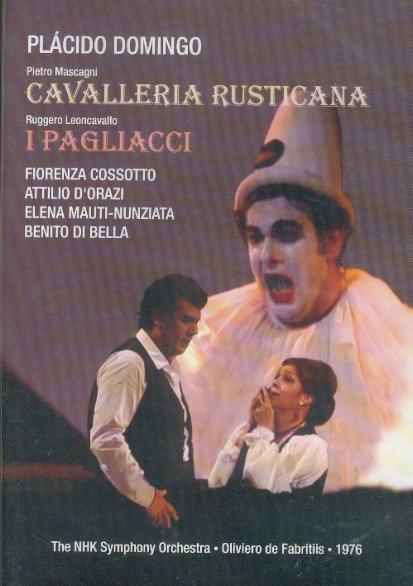 EM-N: Certainly because I’ve never seen a Butterfly
that was as truly Japanese. Puccini had never been to Japan and didn’t
know exactly all the details, so it was not basically Japanese in concept.
But even in earlier productions I would change my gestures in the second
act to become more American. In this production, though, the change
is much more marked. Japanese women tend to hide their hands, and now
I will try to not hide my hands at all in any the second act to show the change
in Cio-Cio-San.
EM-N: Certainly because I’ve never seen a Butterfly
that was as truly Japanese. Puccini had never been to Japan and didn’t
know exactly all the details, so it was not basically Japanese in concept.
But even in earlier productions I would change my gestures in the second
act to become more American. In this production, though, the change
is much more marked. Japanese women tend to hide their hands, and now
I will try to not hide my hands at all in any the second act to show the change
in Cio-Cio-San.
BD: Perhaps in your
final performance before you retire you can slouch and chew gum… [Much
laughter]
Husband: Of course
the Japanese are so tiny and subdued, and the music Puccini wrote is so
strong and big that it doesn’t describe a typical Japanese woman of that
time. Already you have indications of how to play her.
BD: Does that present
inner conflicts – the character fighting the music? [Vis-à-vis
the video shown at right, see my interview with Fiorenza Cossotto.]
EM-N: No, for me
there is no conflict because the way I interpret Butterfly is not so subdued
and tiny. But I change my gestures anyway from the first to the second
act. The first is a traditional Japanese woman with the gestures of
that culture, and in the second the gestures become much broader because she
is much more of a woman. One reviewer here said something that was
quite correct – that at the end I killed myself not for love but for vengeance.
Butterfly kills herself out of spite, and I’m glad that the reviewer saw
this in my performance because this is what I wanted the audience to see.
BD: [With a gentle
nudge, knowing that he is sitting right next to her at the moment]
Would you not die for your real-life husband?
EM-N: I don’t know
– I’d have to be in the situation and see how I felt, but I certainly wouldn’t
kill myself if he went away for three years. Last spring I did a contemporary
opera by Mannino called Vivi and
it has the same plot as Butterfly.
She’s not Japanese but it’s about a woman who loves a man who leaves her
and he promises to come back, and he does but with a wife. So in this
opera, the woman buys a gun and shoots the man dead! He was so happy
after so many Butterflys to see
me portray a different ending to this situation!
BD: Would you shoot
Pinkerton if the director staged it that way?
EM-N: Absolutely!
BD: So you enjoy
that character?
EM-N: [Smiles broadly
and nods her head.]
BD: Are there any
characters that you portray onstage that you don’t like?
EM-N: When I first
look at a new role, I study the point of view of the character even before
I look at the music. I always interpret characters that I like or
at least can sympathize with.
BD: Do you turn
down characters that you don’t like?
EM-N: I am about
to sing Don Giovanni and I was originally
asked to sing Donna Anna, but I told them if they wanted me in that opera
I would sing Donna Elvira. But now I will be involved in another contract
where they already have an Elvira, and since I like to sing Mozart every
once in a while, I will sing Donna Anna even though I’m not really happy
with the character. But now that I’m studying it, I’m preparing it
a bit differently than what is usually done.
BD: So it’s almost
like an exercise in discipline to do this character you don’t care for?
EM-N: Well, I’m
trying to find things that I do like in that character. When I propose
these ideas to the director, if he likes the ideas then everything will
work all right.
BD: Perhaps like
in Vivi you can shoot Giovanni!
EM-N: Yes, I would
definitely approve of that kind of ending!
BD: [To her
husband] I can sell you a bullet-proof vest... [Laughter all
around]
EM-N: Actually I’m
really not a violent person – perhaps I’m too meek at times. I’m given
to extremes of behavior. I’m either one way or the other way, and
it’s hard for me to deal with people who would trample over me.
BD: You’re very
lucky that your husband can travel with you. Does he accompany you
all the time?
EM-N: Yes, always.
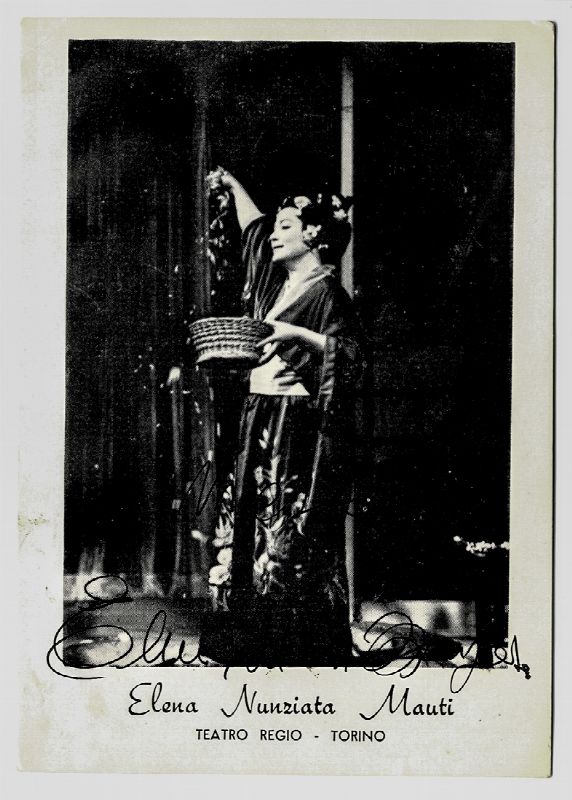 BD: Do you find it difficult to play a love scene
when your husband is in the audience?
BD: Do you find it difficult to play a love scene
when your husband is in the audience?
EM-N: Not at all
because life is one thing and the theater is totally different.
Husband: [With a
wink] I go and warn the tenor before the show…
BD: Are you a tenor
or a baritone?
Husband: I am a
baritone – true men are baritones! [Laughter all around]
* *
* * *
BD: Which role have
you sung more than any other?
EM-N: Madama Butterfly.
BD: Have you sung
it too much?
EM-N: One can never
sing too much a role for which one has a lot of affection.
BD: Even if you
sang nothing but that one role for a couple years?
EM-N: I wouldn’t
get sick of it, but the character would certainly suffer from doing only
the one part.
BD: So you need
a balance?
EM-N: Well, last
year I sang 36 Bohèmes, and
the last few became a little too automatic. The gestures and bits of
stage business were getting too routine.
BD: Is there anything
you can do to inject a little life into those last performances, or do something
to throw your colleagues to have them do something to you?
EM-N: There are
always different performances from one night to another. People do
slightly different things all the time, but I must react to whatever happens
on the stage. Despite doing the same gestures, the spirit of the moment
can affect the attitude in which the gestures are done.
BD: How much does
daily life affect that nights’ performance?
EM-N: If someone
is sensitive, the daily life does have an influence on your performance.
If you have a fight with your husband or with someone else right before coming
to the theater, it will have an effect on how you do certain things.
BD: Are there some
roles you are looking forward to that you’ve not sung yet?
EM-N: One that I’ve
always wanted to do that I will have the chance to do soon will be Manon
Lescaut, and in a few years I would like to sing Tosca.
BD: Are you pacing
your career carefully?
EM-N: Yes.
I’ve been careful so far. We know that there is a lack of lycico-spinto sopranos – which
my voice seems to be – and the attitude of theaters
toward me has changed. Before, I was always asked to sing lighter roles,
and now I’m getting asked to sing heavier roles – Ballo, Trovatore, Manon Lescaut, Tosca, Boccanegra, Luisa Miller, Don Carlo. For a couple of years
I held back and didn’t accept those roles, but now I am beginning to say
yes to the ones that I think are suited to my voice. I’m entering that
repertoire, but very carefully.
BD: Do you enjoy
being booked so far in advance?
EM-N: It gives me
a great sense of security from an artistic point of view and also from an
economic point of view. It’s nice to know that I am wanted.
Husband: [With a
sly grin] But she cannot get ill or die because she has the commitments…
[Laughter all around]
* *
* * *
BD: Have you made
some recordings?
EM-N: No.
There are some “pirated” recordings but I’ve not done any in the studio.
My I Puritani from Dallas and the
Turandot from La Scala are around.
BD: Are you frustrated
that you’ve not been asked, or is it simply the lack of time?
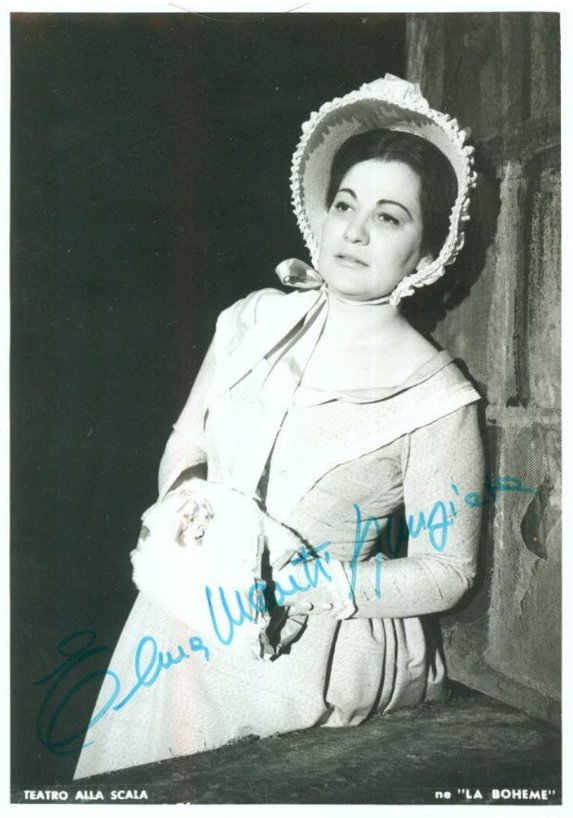 EM-N: I’m mad about it. Not frustrated, but
a bit angry. In some roles, I think I have more to offer than some
singers who are constantly doing recordings, but I have found it hard to
penetrate the recording circle. Of course doing or not doing recordings
has a lot of influence on your career as a whole. I have to prove
myself every time I perform. There are no “examples” to prepare the
audience. Besides not making records I don’t have a press agent to
do all of the details for me.
EM-N: I’m mad about it. Not frustrated, but
a bit angry. In some roles, I think I have more to offer than some
singers who are constantly doing recordings, but I have found it hard to
penetrate the recording circle. Of course doing or not doing recordings
has a lot of influence on your career as a whole. I have to prove
myself every time I perform. There are no “examples” to prepare the
audience. Besides not making records I don’t have a press agent to
do all of the details for me.
BD: But can’t recordings
be too perfect?
EM-N: They tend
to be very cold because we all know how they are made – cutting and pasting
the best sections together. Some singers who have no high notes will
have them on the record and people with no voice have a voice on the records.
I am quite happy with the appearance of “live” recordings which mike much
less.
BD: Are you happy,
then, that some of your performances are out on pirated discs?
EM-N: I am happy
that even if I don’t make any commercial discs, at least there will be the
pirated recordings to remember me by.
BD: You’re moving
more into Verdi now?
EM-N: I don’t think
of myself on the whole as a “Verdi voice” but there are a few roles of his
that I sing – Traviata, Otello, Trovatore, and in a few years Don Carlo. But that’s it as far
as the Verdi roles for me.
BD: Have you ever
sung any operas in translation?
EM-N: I’ve done
a few French operas in Italian, but also I’ve sung them in the original
French.
BD: Does opera work
in translation?
EM-N: No.
For instance, I’ve sung Manon by
Massenet in both French and Italian and it’s completely different in the
translation. The accents and the whole musical line are different.
BD: You don’t find
a closer contact with the audience when they understand each word?
EM-N: Yes, but the
libretto is available, and before coming the people should buy the libretto
and read it.
BD: Is the public
more prepared today than it was some years ago?
EM-N: I think that
people are more prepared today than ten or fifteen years ago. Before,
people came for the high notes and beautiful sounds, but now people are
thinking more about the line and the performance as a whole. I was
most happy to learn of a letter from someone in the audience to a friend
of mine who said, “At last, someone who can sing without any effort!”
Husband: Toti Dal
Monte was a famous Butterfly, but I don’t think she could have done well
in this production.
BD: Is that because
she was from a different age?
Husband: Yes.
BD: Do you think
that people will accept this Chicago Butterfly
25 years ago from now?
EM-N: Probably because
this production is very modern and will last. It came out of the tradition
and extended that tradition to a new level. This, of course, is my
own opinion and there are all kinds of people with all kinds of opinions about
how Butterfly should be done.
BD: Will you be
coming back to Chicago?
EM-N: I hope to
return before another six years have elapsed.
BD: When a house
asks you for a role, do you then wonder if that is the direction you are
going?
EM-N: Yes.
For instance, when they first asked me for Tosca I said no, but decided that perhaps
in three or four years I ought to do it. So that started me thinking
in that direction.
BD: How difficult
is it to say no?
EM-N: My husband
is the one who is called, and when he’s on the phone he will speak in a voice
so that I can hear what is being discussed. So I’ll nod my head or
shake my head to let him know if I want to do that role. It’s easier
for me to let him turn things down.
BD: [To Husband]
Do you like being her agent?
Husband: No, no.
EM-N: [Startled]
This is a true confession for I’ve never thought he didn’t like it.
I try to be as normal as possible in my private life. Most people outside
don’t recognize me as being an opera singer, but despite that I do have
a bit of artistic temperament and I get moody once in a while. This
can make things difficult for people who are close to me, so perhaps it
is difficult for him to be so close to me emotionally and still function
as an agent.
BD: Are opera singers
in general “normal” people?
EM-N: Generally
speaking, opera singers are not really normal people. There are exceptions
– normal people who have beautiful voices – but
mostly they are singers from top to bottom, and that is quite a tragedy.
BD: They
only live for their art?
EM-N: I remember
one instance in Italy when a singer could not find any cab driver who would
take him from his hotel to the opera house. It was the middle of summer
and this singer refused to ride in a car with the windows open, so none of
the cabbies would put up with him. I don’t know whether he finally
walked or what...
BD: One last
question – are you good audience?
EM-N: Yes.
I have a great enthusiasm and take part in what happens on the stage.
If the artist gives a lot, I will give a lot back. It doesn’t matter
if there is a minor flaw, but rather how the overall performance is.
BD: Thank
you for coming to Chicago.
EM-N: Thank
you and thanks to all the listeners. I am happy in Chicago, and I
will be happy to come back again. Arrivederci, and I hope it will not
be another six years before I return.
===== =====
===== ===== =====
-- -- -- -- -- -- --
===== ===== =====
===== =====
© 1982 Bruce Duffie
This interview was recorded in a dressing room backstage at the Civic
Opera House in Chicago on November 22, 1982. It was published in Opera Scene Magazine in January, 1983.
The transcription was re-edited, photos and links were added,
and it was posted on this website in 2013.
To see a full list (with links) of interviews which have been transcribed
and posted on this website,
click here. To
read my thoughts on editing these
interviews for print, as well as a few
other interesting observations, click here.
* * * *
*
Award -
winning broadcaster Bruce Duffie
was with WNIB,
Classical 97 in
Chicago from 1975 until its final
moment as a classical station in
February of 2001. His interviews have
also appeared in various magazines and
journals since 1980, and he now continues his
broadcast series on WNUR-FM,
as well as on Contemporary
Classical Internet Radio.
You are invited
to visit his website for more
information about his work,
including selected transcripts
of other interviews, plus a full list of
his guests. He would also like to call
your attention to the photos and information
about his
grandfather, who was a pioneer in the automotive
field more than a century ago.
You may also send him E-Mail with comments,
questions and suggestions.


 BD:
Does taking curtain calls after a performance break the spell for you?
BD:
Does taking curtain calls after a performance break the spell for you? EM-N: There was no bridge and no flowers. It
was a lacquered platform with a tall cylinder that enclosed the platform
and nothing else but a sort of veil around the cylinder. All there was,
was Butterfly talking to some puppets. You might laugh at this description,
but the concept of the director was that no one in this day and age would
believe that a girl, however young, would believe the “line” from Pinkerton.
So the director was showing Butterfly living in a world of her own making,
and all the characters that enter into it are creatures of her imagination.
They’re not real – it’s all a fantasy. But this is enough about the
other Butterfly – there is so much of interest in this one here in Chicago.
It is very beautiful and it fits with my own concept. Mr. Prince and
I were able to work together very well without any disagreement – it was
a perfect communion of thought and of work.
EM-N: There was no bridge and no flowers. It
was a lacquered platform with a tall cylinder that enclosed the platform
and nothing else but a sort of veil around the cylinder. All there was,
was Butterfly talking to some puppets. You might laugh at this description,
but the concept of the director was that no one in this day and age would
believe that a girl, however young, would believe the “line” from Pinkerton.
So the director was showing Butterfly living in a world of her own making,
and all the characters that enter into it are creatures of her imagination.
They’re not real – it’s all a fantasy. But this is enough about the
other Butterfly – there is so much of interest in this one here in Chicago.
It is very beautiful and it fits with my own concept. Mr. Prince and
I were able to work together very well without any disagreement – it was
a perfect communion of thought and of work. EM-N: Certainly because I’ve never seen a Butterfly
that was as truly Japanese. Puccini had never been to Japan and didn’t
know exactly all the details, so it was not basically Japanese in concept.
But even in earlier productions I would change my gestures in the second
act to become more American. In this production, though, the change
is much more marked. Japanese women tend to hide their hands, and now
I will try to not hide my hands at all in any the second act to show the change
in Cio-Cio-San.
EM-N: Certainly because I’ve never seen a Butterfly
that was as truly Japanese. Puccini had never been to Japan and didn’t
know exactly all the details, so it was not basically Japanese in concept.
But even in earlier productions I would change my gestures in the second
act to become more American. In this production, though, the change
is much more marked. Japanese women tend to hide their hands, and now
I will try to not hide my hands at all in any the second act to show the change
in Cio-Cio-San.  BD: Do you find it difficult to play a love scene
when your husband is in the audience?
BD: Do you find it difficult to play a love scene
when your husband is in the audience? EM-N: I’m mad about it. Not frustrated, but
a bit angry. In some roles, I think I have more to offer than some
singers who are constantly doing recordings, but I have found it hard to
penetrate the recording circle. Of course doing or not doing recordings
has a lot of influence on your career as a whole. I have to prove
myself every time I perform. There are no “examples” to prepare the
audience. Besides not making records I don’t have a press agent to
do all of the details for me.
EM-N: I’m mad about it. Not frustrated, but
a bit angry. In some roles, I think I have more to offer than some
singers who are constantly doing recordings, but I have found it hard to
penetrate the recording circle. Of course doing or not doing recordings
has a lot of influence on your career as a whole. I have to prove
myself every time I perform. There are no “examples” to prepare the
audience. Besides not making records I don’t have a press agent to
do all of the details for me.